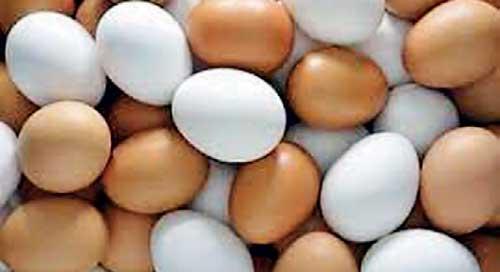01 Jul 2021 - {{hitsCtrl.values.hits}}
The All Ceylon Egg Producers Association says an increase in egg prices might be inevitable, considering the higher input and transport costs, which could stem from the recent fuel price increase, at a time when the people are already grappling with sky-high consumer prices.
 The weekly average retail prices showed the eggs were selling between Rs.15.80 and 16.88 during the third week of June, slightly higher than the retail prices during the second week.
The weekly average retail prices showed the eggs were selling between Rs.15.80 and 16.88 during the third week of June, slightly higher than the retail prices during the second week.
However, the prices were down by between 15.5 percent and 16 percent from a year ago levels, when an egg was selling at between Rs.18.80 and Rs.19.97.
The bakery and confectionary items manufacturers have already raised their prices while the milk powder importers last week renewed their calls for a price increase of as much as Rs.350 a kilogram, citing the higher global market price and rupee depreciation. Maliban Milk Products (Pvt.) Limited Chief Executive Officer Lucky Weerasuriya last week sought to increase the price of a one kilogram packet of milk powder to Rs.1,300, from Rs.945 at present, as the price of powdered milk in the international market had risen to US $ 4,300 a metric tonne, from Rs.2,800, when the retail price was fixed and the exchange rate was Rs.186 to a dollar.
The government last week nearly averted an increase in prices of household gas by deciding to design a common platform for procurement, transportation and storage of LP gas for the two gas distributors using the Hambantota Gas Terminal.
Meanwhile, despite the bumper paddy harvest for two consecutive years, the government last week decided to import 100,000 metric tonnes of rice to tame the rice prices, which have been going through the roof in recent times. Sri Lanka’s national consumer prices rose by 6.1 percent in May, from 5.5 percent in April, while the food prices rose by a staggering 10.3 percent, from 9.7 percent, as the country entered into a stretch of highest food prices in the recent history, mainly due to the supply chain disruption caused by the virus-related restrictions since April third week.
19 Nov 2024 41 minute ago
18 Nov 2024 8 hours ago
18 Nov 2024 9 hours ago
18 Nov 2024 9 hours ago
18 Nov 2024 18 Nov 2024